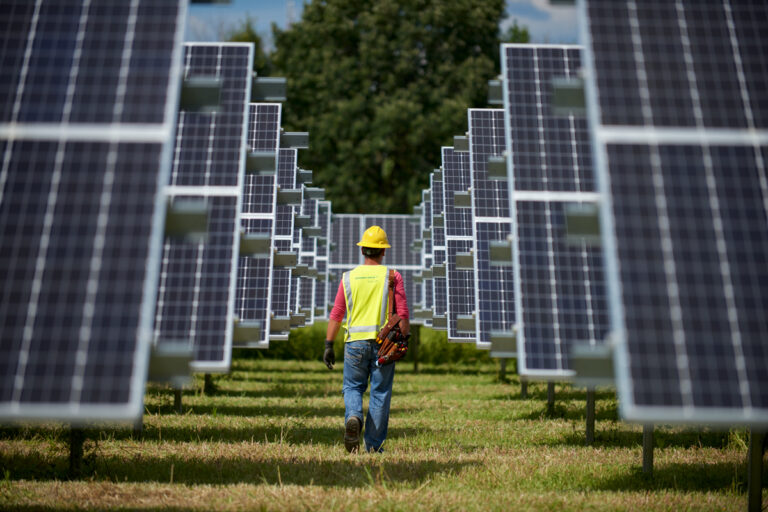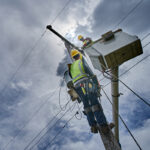
- Kim Kisner
- Business
- 10/11/2022
SVP Brandon Hofmeister Shares How the Company Executes its Sustainability Goals and Some of its Current Projects

How does Consumers Energy, which provides natural gas and electricity to 6.7 million of Michigan’s 10 million residents, with 8,000+ staff members, approach sustainability?
SBN Detroit spoke to Brandon Hofmeister, Senior Vice President of Governmental, Regulatory and Public Affairs for CMS Energy and Consumers Energy, about how the company executes its sustainability goals and about some of its current projects.

Q: When did you begin sustainability efforts at Consumers Energy?
A: From a very broad sense, the company has been focused on sustainability since it was founded. Our current intentional focus to prioritize sustainability specifically within our corporate strategy has been around for about a decade.
Q: What is the organizational structure around executing your sustainability goals?
A: Our corporate strategy is centered around a triple bottom line of people, planet, and prosperity with measurable goals that cascade down throughout the whole business and that are embedded in everything we do. We don’t necessarily source it to one department or team.
We do have an Environment and Sustainability Council that includes top leaders and executives and officers who meet regularly to monitor progress toward key sustainability goals.
We also have a Chief Diversity Officer and a focus on diversity, equity, and inclusion, and this overlaps and encompasses our sustainability objectives. It’s very cross-functional – everyone owns it and it’s embedded within all roles and levels of the company.
Q; Please give some examples of initiatives and priorities in place around people, planet and prosperity.
A: Regarding the planet, I would say our biggest initiative is transforming our electricity generation mix. We will retire our remaining coal plants in 2025 and move completely to clean energy, reducing carbon emissions by 60% from 2005 levels. This is a very aggressive goal but as a company, we are excited about it.
From a people perspective, we are focused on dramatically improving electric reliability by hardening systems to stand up to more intense storm activity and leveraging best practices in technology and management to reduce outages.

We are also deeply focused on the affordability of our services. We’re doing a lot of work to create payment and assistance and energy efficiency programs. We are also dedicated to finding ways to take cost out of our processes and the cost we pass on to our customers, so they get the best value for the services provided.
This is equally important for our business customers. We must make sure electricity is cost-effective so businesses can continue to thrive and create jobs here in Michigan.
Regarding prosperity, part of the triple bottom line is keeping our own business healthy and profitable for our staff and also our investors. We are expected to deliver consistent and low-risk financial results and that affects our community and the economy overall.
Q: Consumers Energy employs more than 8,000 people. How do you share the vision and facilitate action?
A: How we approach the goals in itself is important and I think has been impactful.
We set breakthrough goals and unleash the team to find new and innovative solutions.
It is challenging to set goals that we don’t yet know how to achieve, but this can also be very inspiring, as long as you give the “why” behind the goal. Our team inherently works for our friends and neighbors, and we want to deliver for them. So, whether it’s decreasing carbon emissions or increasing electric reliability, we set goals, give the why, and then let the power of the people take it forward. The outcomes are often quite remarkable and solutions we never thought possible are unveiled.
Q: What do you think is one of the most impactful sustainability practices you’ve put into place to date?
A: Our clean energy program is a good example. We set an ambitious goal to get to net zero carbon emissions by 2040. Within the framework of conventional wisdom, this originally appeared to be impossible. But the goal has opened up new ways of thinking. Retiring the coal plants was originally slated for 2040, but that’s been moved up to 2025 as I mentioned. We have a north star to reach and are working on this carbon goal every day.
Q: What do you point to as an impactful project you are putting into place in the next three to five years?
A: Electrification of vehicles is a big game changer for our industry. The company has a breakthrough goal to have a million EVs in service by 2030. This is great for the planet and great for our customers’ pocketbooks.
The more electricity we all use, the more electric bills decrease. There are set costs for infrastructure, and if more people are using that infrastructure the cost per unit of electricity goes down. So, it’s a win-win.
Q: How do you integrate the community and keep them informed?
A: This is a huge part of our work. We spend a lot of time communicating what we are working on and why, but it’s a two-way street. We also want to understand the people and community we serve, so we conduct formal and informal stakeholder outreach. We do materiality assessments internally and externally. We engage customers and educate them on how they can save energy by considering an electric vehicle or participating in renewable energy programs.

Most people don’t think about their utility service unless the power out goes out, but it’s important to continually communicate our broader mission. We spend time engaging in a variety of channels with customers to have two-way communication.
Q: What advice would you give to SE Michigan businesses when it comes to laying out sustainability goals and achieving them?
A: Start with what’s important to the business. Understand the impact the business is having and focus on a goal. Also engage stakeholders.
Set ambitious goals and always communicate the why. It’s easier to bring people in when they are engaged versus being told.
And finally, don’t have too many goals. Prioritize, set a few very ambitious and solid goals, get people fired up, and cascade action items to groups so they can see the line of sight in their daily work and take ownership.
Be sure to subscribe to our newsletter for regular updates on sustainable business practices in and around Detroit.
Kim Kisner
- All
- Business
- Community
- Education
- Events

ZF Group, a global technology company with its North American headquarters in Northville, specializes in systems for passenger cars, commercial vehicles, and industrial technology. With a focus on next-generation mobility, the company develops solutions that address electrification, automation, and digitalization while aiming to improve safety, efficiency, and sustainability in transportation. SBN Detroit interviewed Anuj Shah, Sustainability Lead, for the Americas, to explore the most pressing environmental challenges in...

The Chip Bag Project, based in Detroit, is a sustainability initiative that upcycles hard-to-recycle snack packaging — particularly chip bags — into insulated sleeping bags for individuals experiencing homelessness. Founded by Eradajere Oleita, the project addresses both environmental waste and housing insecurity by transforming materials like Mylar into practical, thermally efficient solutions. In June, Oleita was among Trelllis’s 30 Under 30, its annual recognition of the brightest young...

PowerPanel, headquartered in Oxford, focuses on sustainable energy technology with a particular emphasis on hot water systems and thermal energy capture. The company designs and manufactures modular solar hybrid systems that integrate both photovoltaic and thermal components into a single unit. Its goal is to offer energy solutions that are more efficient, durable, and economically viable for a range of commercial and industrial applications. SBN Detroit interviewed Garth...







